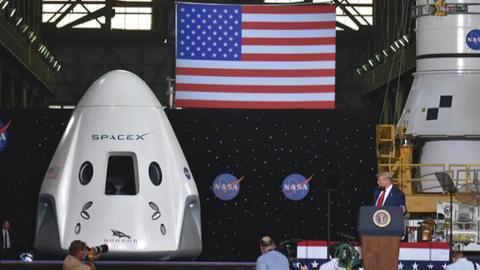Two brave American souls are expected to lift off from Apollo 11’s historic launch pad on Saturday afternoon. When they do, the feat will mark the first time that the private sector blasts humans into orbit.
Since 2011, all U.S. astronauts have been launched from a Russian spaceport. This giant leap for America’s leadership in space bodes well for energizing an entrepreneurial spirit in the heavens. But outdated federal rules that favor foreign satellite companies over their American rivals inadvertently threaten to drive crucial investment and innovation overseas in this burgeoning slice of the economy.
If the current regulatory trajectory isn’t corrected soon, other countries could replace the U.S. as the leader in space investment and innovation undermining our space-related supply chain security.
The global “space economy” is robust with more than $360 billion in annual revenue and 3 percent growth in 2018, according to the Satellite Industry Association. Space-related commerce affects a wide swath of human activity: telecommunications, aviation, agriculture, meteorology, science, national security and much more.
The backbone of this increasingly vital economic sector is the satellite industry which includes satellite services such as navigation and communications, satellite manufacturing, the launch industry and ground equipment manufacturing.
The U.S. satellite market generates 43 percent of the revenue of the global satellite industry. Yet antiquated federal rules allow foreign satellite operators access to our robust market while exempting them from many of the same rules governing American operators.
We have unwittingly created a regulatory asymmetry that could be driving American investors to become licensed in and operate from foreign jurisdictions that are friendlier to satellite companies, carrying their capital and technologies with them.
For example, U.S. rules to reduce orbital debris so we can safely launch our astronauts with minimal fear of them colliding with space junk apply only to American operators. We give foreign operators access to our market with no obligation to comply with our space debris rules. Not only does this unfairly hamper U.S. companies, it undermines critical efforts to clean up space.
Similarly, American companies licensed by my old agency, the Federal Communications Commission, have to post performance bonds of up to $5 million per satellite license to ensure that they build out their satellite systems as promised, which ties up badly needed capital.
Foreign satellite operators are exempt from these costs and understandably ask to enter the U.S. market after they have constructed fully operational satellites under easier foreign rules. This loophole provides another incentive for satellite companies to become licensed in foreign countries, operate under lighter regulations abroad and then enter the American market with a regulatory and financial advantage.
The results of this disparity were brought to light by a recent FCC proceeding to auction satellite spectrum called the “C-Band” for terrestrial 5G licenses. All of the satellite companies operating in the C-Band are foreign and will enjoy a share of the auction’s proceeds.
To make matters worse, the governments of our global competitors are investing directly into their domestic satellite companies while their regulators find ways to favor the home team. China and Russia are the obvious examples, but even allies like Canada, France and the U.K. are working hard to gain advantages over the U.S. in space.
The U.K. Space Agency’s strategic plan makes it a government priority to sell “U.K. capability abroad” to “increase the U.K.s’ share of the world space market” and “to provide a regulatory environment that promotes” the British space sector.
New satellite companies are crowing about their decisions to take investment capital and technology overseas and away from America. U.K.-based OneWeb’s CEO proudly declared earlier this year that they would beat their U.S. rivals “just because we’re not American,” as they launched their satellites from attractive facilities in … Kazakhstan.
Bursting over the horizon, however, the American private sector will build the next-gen technologies for the newly created U.S. Space Force, the upcoming manned moon mission and space tourism.
As the COVID-19 crisis has taught us, we must protect America’s supply chain security. With our competitors taking advantage of our loopholes, U.S. public policy should create regulatory and tax incentives to on-shore more of the space economy to create new jobs and develop world-leading technologies within our borders.
Driving capital and innovation abroad could result in the “Huawei-fication” of space where foreign-made hardware and software dominate the Final Frontier. Preventing that is crucial to protecting American national security in the 21st Century.
Beyond rationalizing our regulations before it’s too late, the U.S. should boldly go further and make America a globally attractive light-touch “free enterprise” zone for the space economy. We can’t afford another “Sputnik moment.”
Read in Fox Business















